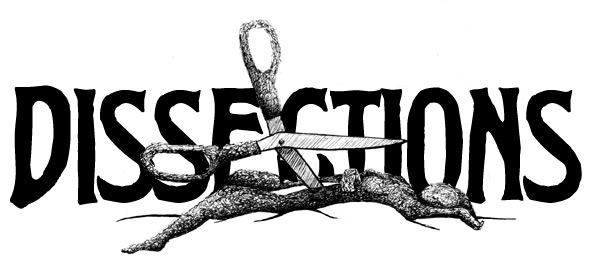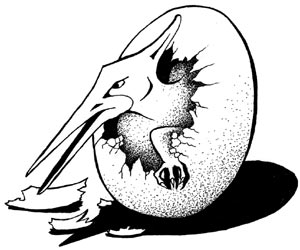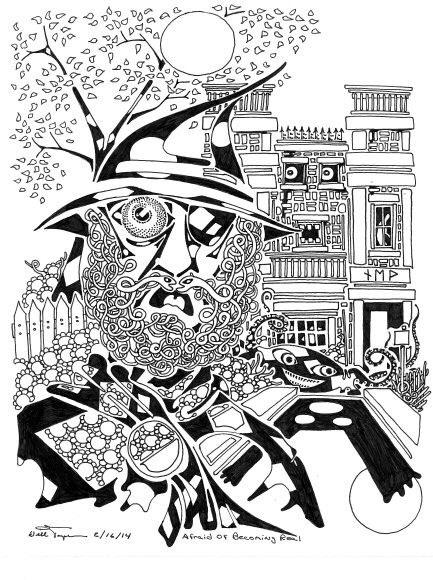[an error occurred while processing this directive]



Artwork: Afraid of Becoming Real by Will
Jacques
The Coastal Town
Bassey Arikpo
There is a town down on the coast of the state of Washington by the name of Calhoun, named after the President Andrew Jackson's vice president: John C. Calhoun. Rumour has it the founder of the town was related to the former vice president. The town is over two centuries old, with a history that would barely fill up an index card. The population doesn't even pass half of a hundred. Calhoun is hidden away on a peninsula that produces a tributary that breaks up the Pacific Ocean to the west from an unnamed bay to the east. Along the thinnest part of the land mass is the end of a cobble road that starts from an old beach house and trails for five miles. There are five houses on each side of the stretch, which dot it like pieces on a chess board. The road turns at a musty bar and gets wider as it passes an old wooden church and some farms with a dirt road breaking off from it towards the poorly built municipal centre. The road converts to pavement instead of cobble, blanketed with vegetation, and ends at an old country highway that takes its users to Seattle up north and Portland down south. The town has no formal police department, just two men who share a rusted out old Jeep from the early sixties, one doing the day patrol and the other at night. The mayor is also a judge and comptroller and any other municipal leader a town would need. The residents are fisherman, farmers or widowers and have lived there with their families for generations.
In the 1980s, a sweltering heat wave struck the northwestern seaboard that brought temperatures into the triple digits. In a town like this there was no air conditioning, just a few sparse fans for the wealthy, or what was considered wealthy by Calhoun's low standards. The mayor and some residents were restlessly going over a map of the forest nearby to determine what to do about an influx of cougars in the area, all sweating through their cheap flannel shirts. Several people were stumbling around in the bar, getting drunk on the only two alcoholic drinks served, a weak beer with too much hops, and old tequila. Others were working the fields, gathering the town's weekly sustenance. The younger members of town were splashing around under the docks in the small harbour, trying to see who could swim under the aged vessels.
Later in the day, the usual calm was broken when an unknown man walked into town. He was over six feet tall and moderately muscled, with a healthy build. He carried no luggage except a small satchel. He stopped by the fenced house and asked the man working there if there was lodging available. The worker stared for a spell but told him there was none, but to try and ask one of the neighbours to stay. The worker had more questions; however, the man had already started walking down the cobble path. He stopped at the first house he saw, parallel to the bar, where a widow, frail with age, was sitting on the front steps, drinking iced tea. He admired the houses on this stretch. They were 70-year-old stucco structures that would crumble within the first ten minutes of a storm, since they were fragile from decades of decay and a lack of maintenance. She agreed to let him stay without question and let him inside.
Meanwhile, the worker had already told the pastor, who told several other residents about the mysterious man. Word spread to the patrolman who powered his Jeep to the town hall. Calhoun was a town that rarely received visitors, barring the panel trucks that came by to deliver goods or pick up fish and crops, along with the occasional motorist looking for gas for his automobile. The fact that this man came here on foot was odd. The town hadn't had a visitor arrive on foot since the early 20th century, and it was still bizarre then, since horse and buggy were still popular then. The patrolman debated with the mayor whether they should run the man out of town, since he was unknown and staying with a woman who lacked inhibitions since her husband died fifteen years earlier. Though faced with much opposition, the mayor decided to let this man stay.
Later that night, the man walked into the bar and sat down with a cold beer and drank slowly, observing the decorations mounted on the walls of the establishment. It didn't take long for trouble to arise, when six men, one being the day patrolman, congregated at the other end of the bar, them converged towards the man. They were against him being anywhere near here and let that be clear to him. He simply laughed and ignored them, until one of them grabbed his shoulder, which resulted in the aggressor lying on the floor with a broken collarbone. The others fled, with the exception of the patrolman, who threatened the man severely, then exited in a fury.
The next morning, shock had infected all the residents, when the day patrolman wound up dead. He had been walking home when he was suddenly knifed to death. All the fingers of blame fell upon the man, who had a plausible alibi, which was confirmed by the widow he was staying with, who said he came back shortly after the patrolman left. He had not left since. With no evidence, the man was innocent of any crime; however, the residents threatened him and insulted him. He spent the next day outside, exploring the terrain, as he said. He won the blame game again when another resident wound up dead in a similar fashion as the patrolman. However, with a solid alibi and no evidence, he was cleared of any crime.
This played out two more times, when two more victims were found. Nobody could figure out who was responsible. State troopers were called in to investigate, but there was no forensics to prove the man did it, or anyone else, for that matter. The residents never bought the story. They accused him and swore their lives on it. Eventually, all of the residents formed a mob and asked the man to leave, or he would be dead next. He didn't argue, just strolled down the road and hitchhiked to Oregon from the highway. Soon after, several more murders occurred, including the mayor. Nobody could whip up a theory that had any standing.
Later, some residents questioned the widow who the man had stayed with, about what happened. She only had this to say:
"The man you chased out of here was our last hope. He was an investigator who was trailing a known killer. He had tracked him to here and was halfway through an investigation when you made him leave. This killer is relentless. If that investigator was still here, the killer would have fled elsewhere and left us alone. Now you fools have screwed us for good. He will kill and kill until everyone is gone. He will make some of you live your life in fear, sometimes watching you, while you expect him to strike, and he will wait until you are most frightened. The God you worship can't help you now. You will wish that Satan would drag you into the fiery pits of hell instead of this torturous suspense. The demons that exist inside you will come to light as you slowly become weak from your growing insanity. Sometimes, you will see him there and he won't be. But you will never know. You will commit suicide rather than suffer the endless dread of being the next victim. This killer only fears one man, and you just kicked him out, and he is never coming back. Enjoy the personal hell you have created. I am leaving and never coming back."
She was more right than ever, as several more people died, and others became insane with fear. Along the now remote streets, people stayed shuttered in the gloomy solitude of their homes. The municipal centre rotted away after the mayor’s death. The farms quit producing goods, as people refused to leave their houses. This once cosy sea town became an ominous settlement echoing the chuckles of the sadistic killer lurking in the woods. Sometimes a private investigator or teams of explorers would head out to document or find the killer. But to no avail. No investigator has ever caught or even glimpsed him, sometimes ending up a victim. The original man who came to solve the crime was nowhere to be found. The citizens wished he would come back, praying every day he would return. The children, who were now in their eighties, lived in constant fear. The small population of the town grew smaller and smaller as people died from treatable diseases, left untreated as the afflicted were afraid to leave. In fact, people died more from this than from the killer himself. Eventually, the last few citizens perished when they met at a house together, the five of them, and tried to figure out an escape plan. They would start up the old patrol jeep and leave the area and head to Seattle. They would go in the morning and never come back. However, that never happened. That night, the killer was watching them, knocking on the walls and laughing. They knew it, and knew he would stop them. One man pulled out his revolver, brought it to his neck and pulled the trigger. The rest did the same. They felt it was the only way out. The town was empty except for one, who left a few days later to find a new town to terrorize. When investigators came to see what had become of the town, and developers came to create new residential buildings, they uncovered a document from the wreckage of the old municipal building. It had the unofficial town motto that had become infamous, as it was how residents here lived:
"You will either die by him, or by his constant shadow."
**************************************************************************
